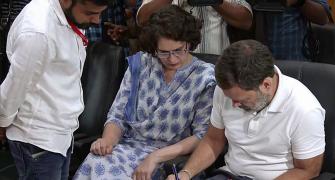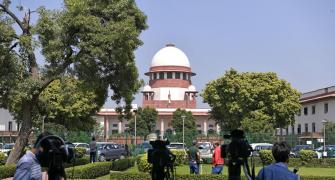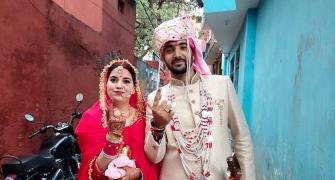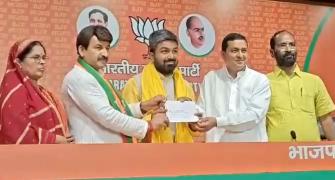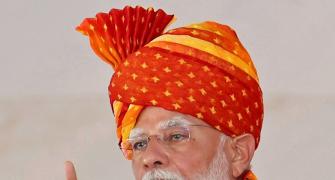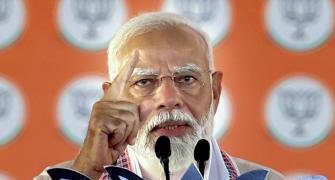Salman Rushdie broke off his national tour to promote his latest novel Shalimar the Crown so that he could be in New York November 8 to join some of America's most distinguished writers, including Edward Albee, Paul Auster, Don DeLillo, Dave Eggers and Philip Gourevitch, to denounce, among other things, the treatment of detainees in Guantanamo Bay and abroad.
The writers read brief excerpts from the texts that had inspired and sustained their convictions against governmental tyranny that includes arbitrary detention.
The event, which was free, was called the State of Emergency. The first such event was held last year, also in New York, the home of the PEN American Center.
Rushdie, who gingerly backed the American war against Iraq, and soon after began criticising the government's policy on torture and its attempts to curtail civil liberties in America is the president of PEN. Considered to be the first human rights organisation in the world, PEN is over 130 years old.
Denouncing the 'invisible gulags' America has been setting up in allied countries such as Egypt to forcibly interrogate terrorist suspects, Rushdie said it was ironical that one of the gulags was set up in a former Soviet Union country. America used to vigorously denounce the prison camps in those countries not too long ago, he said.
PEN has been backing writers freedom across the world, denouncing torture and championing more open societies, he said. If it did not carry out its mission in America, it would have no genuine voice, he argued.
Rushdie wondered why President Bush was threatening to veto (and that would be his first) a bill forbidding torture of political detainees and torture suspects that was initiated by a Republican, Senator John McCain.
If America does not torture its detainees as Bush claims, Rushdie said the president has nothing to worry about in McCain's bill.
At last year's State of Emergency event, Rushdie had talked about how 'people come to the United States because they admire freedom of expression.' 'It's what attracted me here,' he had continued. 'It's a tragedy to think that that has been threatened.'
Before arriving on stage, Rushdie denounced the Bush administration's increased control over the media, the publication Liberation wrote. 'For 82 years, PEN has fought for this freedom in other countries,' he said. 'It is important not to ignore the problem when it arrives at our doorstep. We have launched a campaign to amend the Patriot Act, which allows intelligence-gathering agencies to keep watch over the electronic correspondence and reading lists of potential terrorists.'
Denouncing the USA Patriot Act, PEN resolved to fight its key provisions. Its campaign statement read in parts: 'Before 9/11, the United States criticized governments that suppressed freedom of speech and information and disregarded due-process protections in the name of fighting terrorism. We officially condemned trials by secret tribunals, protested secret detentions, and challenged restrictions on access to information and limits on the right to criticise government actions. We rejected the same arguments our own leaders now offer to justify emergency powers. In a bitter turn, many governments we criticised then now point to US behaviour to justify new levels of repression.'
Signatories to the campaign to end some of the Patriot Act's provisions include scores of writers, including Katha Pollito, Marge Piecry and Francine Prose, Jhumpa Lahiri, Meena Alexander, Anita Desai, and Aniruddha Das.
At the November 8 event, Rushdie read from Michael Herr's shocking Dispatches, sharp observations on the Vietnam War. The novelist then drew the parallels between Vietnam and Iraq, adding that Iraq today is far more fragmented and tyrannical before Bush declared the war. Just like Vietnam, he added.

